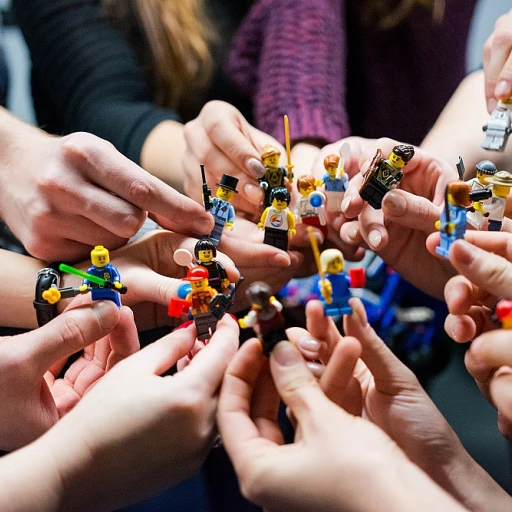Defining the Skills Development Facilitator
The Role of the Skills Development Facilitator in the Workplace
A Skills Development Facilitator (SDF) plays a crucial role in modern business environments, particularly in the ever-evolving landscape of workplace skills and training. As businesses strive to remain competitive, the need for continuous improvement and development is more apparent than ever. Enter the skills development facilitator, a pivotal figure responsible for identifying compliance needs and facilitating career growth through targeted training programs.
What sets an SDF apart is their ability to align education and training initiatives with the strategic objectives of an organization. By identifying skill gaps within the workforce and developing a comprehensive skills plan, facilitators aid in fostering employee growth, enhancing productivity, and ensuring that businesses stay aligned with industry standards. These professionals are adept at creating annual training programs that cater to the dynamic landscape of career development.
Many companies, including those in South Africa, leverage the expertise of a skills development facilitator to optimize their contributions to the Skills Education Training Authorities (SETAs). This alignment not only facilitates career advancement but also enables organizations to adhere to regulatory and compliance standards, thereby ensuring a skilled and competent workforce ready to tackle present and future challenges. Through strategic planning and effective execution, development facilitators play a vital part in shaping the learning culture within businesses, helping employees learn and adapt continuously.
The Importance of Skills Development in Management
The Pivotal Role of Skills Development in Management
Skills development plays a crucial role in ensuring that businesses remain competitive, productive, and successful. In today’s ever-evolving work environment, the ability to adapt and grow is indispensable. Employees need to continuously learn and develop new skills, making the role of a facilitator in this process increasingly important. Effective skills development ensures that employees are well-versed in both technical and soft skills, enhancing their ability to contribute positively within their workplace. Facilitators are central in helping to identify skill gaps within organizations and, through tailored training programs, address these deficiencies. By leveraging development training, employees can embark on facilitated career development journeys that not only satisfy individual growth aspirations but also align with broader business objectives. It plays an integral part in career counseling, providing employees the guidance necessary to carve out future career paths in alignment with organizational goals. Moreover, development facilitators work closely with businesses to ensure compliance with the sector education and training authority (SETA) requirements, critical in jurisdictions such as South Africa. They ensure that workplace skills plans are developed in accordance with these regulations, which supports organizational objectives and annual training targets. Additionally, with the rapid pace of technological advancement, the continuous improvement of skills has never been more critical. Facilitators bridge the gap between current employee capabilities and required future skills, facilitating a culture of lifelong learning and adaptability. For more on how key roles like HR managers support skills enhancement, enhancing skills with HR manager training programs offers valuable insights.Key Competencies of a Skills Development Facilitator
The Essential Qualities and Abilities Required
The role of a Skills Development Facilitator (SDF) requires a comprehensive set of competencies to effectively fulfill its purpose in the workplace. Whether you're involved in education, workplace skills programs, or compliance, these key competencies must be mastered by any facilitator aiming to bridge skill gaps and support continuous improvement.- Understanding of Skill Gaps and Needs: A good development facilitator must possess an acute ability to identify skill gaps within an organization. This involves understanding both the short-term and long-term business objectives and aligning skills development programs to meet these needs.
- Strong Communication Skills: As an effective SDF, conveying information clearly and persuasively is essential. Communication underpins the delivery of training programs and facilitating career development, ensuring that people learn effectively and goals are met efficiently.
- Analytical and Strategic Thinking: Facilitators are often required to analyze data related to employees' skills, training programs, and outcomes, enabling them to tailor programs that will most benefit the business. This also involves skillfully navigating situational questions in competency empowerment.
- Adaptability and Learning Orientation: Given the ever-evolving nature of businesses and education training, facilitators must remain flexible, adapting to new methods and tools for effective delivery. This ensures they are up-to-date with the best practices in skills development and employee education.
- Interpersonal Skills and Empathy: Developing soft skills such as empathy and understanding assists SDFs in fostering trusting relationships with employees. This enables them to provide better career counseling and mentor individuals in their learning and career development journeys.
Implementing Skills Development Programs
Executing Effective Skills Development Initiatives
The task of executing skills development initiatives effectively rests heavily on the shoulders of the Skills Development Facilitator (SDF). These facilitators play a pivotal role in bridging the gap between identified skill needs and the workforce’s current capabilities in businesses. With a focus on continuous improvement and compliance, development facilitators must strategically align programs with the company's overall business objectives. This process often involves assessing the workplace skills and determining what skills are missing or could use enhancement. To implement successful skills development programs, SDFs should consider:- Conducting a Skills Audit: This involves evaluating current employee competencies and identifying skill gaps that hinder employees’ career development within the organization.
- Aligning with SETA Guidelines: In South Africa, for instance, SETA compliance ensures that training initiatives meet national education and training standards. Adhering to these guidelines guarantees the quality and relevance of both development training and workplace skills programs.
- Crafting a Strategic Skills Plan: A thorough skills plan should outline the objectives, timelines, and methods for achieving skill enhancement, facilitating career progression, and attaining training certification.
- Leveraging Education and Training Resources: Utilizing available education training programs can maximize the impact of skill development. SDFs must curate resources that not only meet the technical skill requirements but also bolster essential soft skills.
- Facilitating Continuous Learning and Development: Promoting a culture of continuous learning within the workplace encourages employees to embrace new challenges and fosters personal growth.
- Regular Evaluation and Feedback: Implementing a cycle of assessment and feedback through annual training reviews help measure the effectiveness of the training programs, ensuring they meet the evolving needs of both the employees and the business.
Challenges Faced by Skills Development Facilitators
Overcoming Hurdles in Skills Development Facilitation
In the dynamic landscape of skills development, facilitators face numerous challenges affecting their ability to provide effective guidance and support. As businesses increasingly recognize the importance of continuous learning, Skills Development Facilitators (SDFs) must continually adapt and find innovative solutions to ensure successful outcomes in their training programs.- Navigating Compliance Requirements: One of the significant challenges for development facilitators is ensuring alignment with regulatory standards. In South Africa, compliance with the Sector Education and Training Authority (SETA) requirements is crucial. This entails meticulous planning and documentation of workplace skills plans and annual training reports to meet these standards.
- Addressing Skill Gaps: Facilitators are tasked with identifying and bridging skill gaps within organizations. This involves not only assessing current employee competencies but also forecasting future needs. Effective skills assessments and targeted training programs are vital in equipping employees with the necessary tools for career advancement and business success.
- Providing Comprehensive Training: Balancing between soft skills and technical skills training is imperative for holistic development. SDFs must ensure that training programs address both aspects to foster a well-rounded workforce. This includes facilitating career development workshops, education training sessions, and continuous improvement courses.
- Engaging Employees in Learning: Encouraging active participation in training programs can be challenging. Development facilitators must create an engaging learning environment where employees are motivated to improve their skills. Innovative approaches such as career counseling, development training, and personalized learning paths can significantly enhance engagement.
- Maintaining Relevance in a Changing Workplace: With rapid technological advancements affecting business operations, SDFs must ensure their programs remain relevant. Adapting to new learning technologies and strategies helps facilitators stay ahead, ensuring employees can thrive in an evolving workplace.
The Future of Skills Development Facilitation
The Evolving Landscape of Skills Development
The role of skills development facilitators (SDFs) is set to change continuously, given the pace at which the corporate world is evolving. With businesses recognizing the necessity for continuous improvement, facilitators are tasked with the pivotal responsibility of ensuring that both soft skills and technical expertise are not only taught but are adapted to meet ever-changing industry standards. As the interest in career development and learning within the workplace intensifies, facilitators will be actively involved in bridging skill gaps. This includes implementing progressive education training programs that align with both compliance and SETA requirements. In fact, the need for annual training plans tailored to the unique needs of organizations emphasizes the critical nature of their work.Adapting to Technological Advancements
The rise of digital tools in training has transformed how people learn. Development facilitators must embrace these technologies, integrating them into existing frameworks to enhance productivity and learning outcomes. This adaptation requires staying abreast of new educational platforms that can provide interactive and flexible learning opportunities.To navigate the complexities of technology-assisted career development, skills development facilitators will need to focus on training certification programs that not only teach necessary technical skills but also focus on nurturing soft skills such as communication, negotiation, and leadership.








